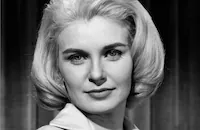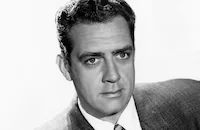Count Three and Pray

Brief Synopsis
Cast & Crew
George Sherman
Van Heflin
Joanne Woodward
Phil Carey
Raymond Burr
Allison Hayes
Film Details
Technical Specs

Synopsis
At the close of the Civil War, former Union soldier Luke Fargo walks to his small Southern town home with two neighbors, former Confederates Floyd and Jake Miller, only to find his house burned and the townspeople bitter over his choice to fight with the Union. Luke seeks out the abandoned church but finds it also burned down. In the surviving parsonage, Luke discovers Lissy, a young girl dressed in boy's clothing, who warns him away with a shotgun and insists that she has squatter's rights to the dwelling. Luke informs Lissy that he intends to rebuild the church and live in the parsonage as the new preacher. Luke then goes into town and is forced to a fight some men by the resentful supply store owner, Yancy Huggins, whose crippled hand kept him from the war. Back at the parsonage, Luke offers Lissy half of the house until he can get her into an orphanage. Later that evening, Colossus, the Decrais family steward, summons Luke to their faded mansion. There Luke tells Mrs. Decrais of his plan to rebuild the church and his turn to religion after the carnage of Vicksburg. Former belle Georgina Decrais insists on driving Luke home and recalls their romantic relationship before the war, but Luke advises her that is part of the past. When Georgina hints that she has offered herself to Huggins in exchange for food and supplies, Luke says nothing. The next day Lissy helps Luke capture a large white stallion, and later, when Luke frets over how to raise money for rebuilding the church, Lissy goads him into racing, but he refuses. Nevertheless, Luke goes to town where he meets Albert Loomis, the head of the lumber mill and a keen gambler. Luke asks Albert to extend him credit for a supply of wood, but Albert encourages him to race for it and Luke finally agrees and wins the race. Then Selma, the town madam, enthusiastically welcomes Luke home only to learn, with dismay, of his religious conversion. Selma nevertheless gives Luke a black suit, money and another supply of wood. Luke and Lissy begin rebuilding the church, and are eventually joined by Colossus and later the Miller family. Georgina reveals to Luke that Huggins has demanded she move in as his housekeeper and pleads with Luke to take her away, but he refuses. Upon returning home, Luke finds Lissy battling a fire outside the church. She relates how several men started the blaze and claims to have shot one as they escaped. Outraged, Luke heads off to challenge Huggins, but stops to tend to Lissy's wounded victim, Swallow. The following Sunday Luke is surprised when several townspeople arrive for the church service. Huggins also arrives with his bookkeeper, who reads aloud the congregation's debts, as Huggins declares that no one who attends church will receive further supplies until he is paid. At the dedication, the congregation is sparse and when Matty Miller begins singing a hymn, Huggins' cohorts counter with a raucous song, until Floyd, Jake and eventually Luke start a fight with them. Later, Lissy finds Luke alone and despondent, wishing that he could inspire people to come to church for the message, not out of friendship for him. He laments that he has none of the qualities he hoped to teach and, believing that he has failed, decides to leave. As Lissy angrily accuses him of quitting, Mrs. Swallow arrives with her numerous children and insists on a baptism for her latest child. Startled, Luke complies and humbly decides to stay on. Soon the church settles into a regular routine for the town and although Lissy refuses to attend, she watches Luke with pride. Meanwhile, Georgina moves in with Huggins, but on the day of her arrival, Huggins beats her for having a haughty attitude. Luke teaches Lissy to read and write, but she remains upset that he fails to recognize her feelings for him. Just as she informs him that she plans to move out, however, Georgina arrives, bruised and bleeding, and begs Luke to take her in. Lissy leaves in a jealous rage, but is turned away by Selma and Albert at the gambling saloon. Later, however, Selma takes Lissy under her wing when she realizes the younger girl is in love with Luke. Luke brings help for Georgina, but finds Huggins and the Millers at the parsonage. Huggins accuses Luke of beating Georgina and sends for the bishop. The bishop arrives in a few days and holds an inquiry at which Matty and others testify for Luke, although admitting that he gambled and fought, and has been living alone with Lissy since his return. A recovered Georgina, now married to Huggins, insists that Luke beat her and informs the bishop that Lissy is not a child, but eighteen years old. Lissy then arrives in a fancy gown trimmed with feathers, borrowed from Selma, and meets with the bishop. Announcing his decision, the bishop chides Luke for his unorthodox behavior, but as Luke has never been formerly ordained, he is absolved. When the bishop later overhears Lissy telling Luke she was not aware they were living in sin, however, he hastily insists upon marrying them.

Director
George Sherman
Cast

Van Heflin

Joanne Woodward

Phil Carey

Raymond Burr

Allison Hayes
Myron Healey
Nancy Kulp

James Griffith
Richard Webb

Kathryn Givney

Robert Burton
Vince Townsend
John Cason

Jean Willes
Adrienne Marden
Steve Raines
Jimmy Hawkins
Juney Ellis
Mary Marlo
Ed Minton
Crew
Clay Campbell
Lambert Day
Carter Dehaven Jr.
George Duning
Burnett Guffey
Helen Hunt
Henri Jaffa
John Livadary
Jean Louis
William A. Lyon
Herb Meadow
Arthur Morton
Robert Peterson
Ted Richmond
Morris Stoloff
Frank [a.] Tuttle

Photo Collections
Videos
Movie Clip


Film Details
Technical Specs

Articles
Count Three and Pray
Shot in Technicolor and Cinemascope on a very tight schedule in January and February 1955 at the North Ranch, located at Lindero Canyon Road and Kanan Road in Agora Hills California, Count Three and Pray was produced by Copa Productions, Inc., a company started by Tyrone Power and producer Ted Richmond and distributed through Columbia Pictures. The working title of the film was The Calico Pony. Daily Variety reported in June 1954 that Herb Meadow's original story had been bought by producer Leonard Goldstein as a vehicle for Gary Cooper, but it was Van Heflin who would eventually land the role. Also in the cast were Phil Carey, Nancy Kulp, Allison Hayes and Raymond Burr as the villainous white-trash businessman who has taken over the town after the war.
The film premiered at the Paris Theater in Joanne Woodward's hometown of Greenville, South Carolina in October 1955. The Hollywood Reporter praised Woodward's performance: "Possessed of an offbeat gamin charm and a sense of comedy timing that would be worthy of a veteran, she treats the audience to laugh after laugh."
Producer: Ted Richmond; Tyrone Power (uncredited)
Director: George Sherman
Screenplay: Herb Meadow (dialogue); Herb Meadow (story "Calico Pony")
Cinematography: Burnett Guffey
Art Direction: Robert Peterson
Music: George Duning
Film Editing: William A. Lyon
Cast: Van Heflin (Luke Fargo), Joanne Woodward (Lissy), Phil Carey (Albert Loomis), Raymond Burr (Yancey Huggins), Allison Hayes (Georgina Decrais), Myron Healey (Floyd Miller), Nancy Kulp (Matty Miller), James Griffith (Swallow), Richard Webb (Big), Kathryn Givney ( Mrs. Decrais), Robert Burton (Bishop).
C-102m.
by Lorraine LoBianco

Count Three and Pray
Quotes
Trivia
Notes
The working title of this film was The Calico Pony. A June 1954 Daily Variety item reported that producer Leonard Goldstein purchased the story from writer Herb Meadow and offered the starring role to Gary Cooper. A November 1954 Hollywood Reporter item notes that Harold Rose of Famous Artists negotiated the sale of Meadow's script to Copa Productions, a company established by actor Tyrone Power and producer Ted Richmond. The film marked actress Joanne Woodward's motion picture debut. In complimenting Woodward's performance, the Hollywood Reporter critic stated: "Possessed of an offbeat gamin charm and a sense of comedy timing that would be worthy of a veteran, she treats the audience to laugh after laugh."

Miscellaneous Notes
Released in United States Fall October 1955
Screen debut for Joanne Woodward.
CinemaScope
Released in United States Fall October 1955













